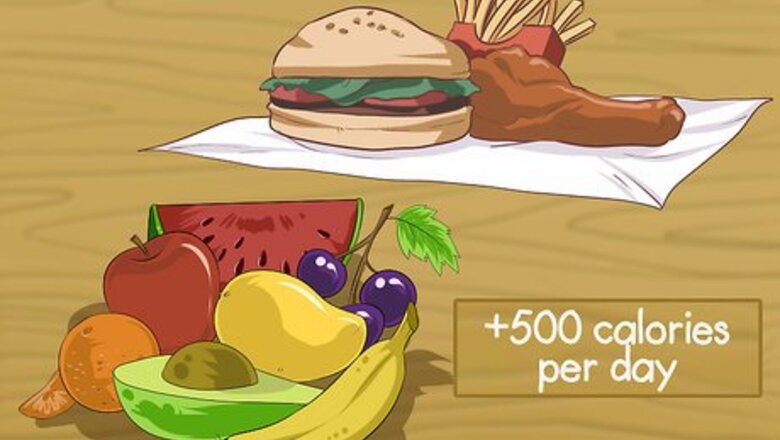
views
X
Research source
Breastfeeding is highly recommended by the American Academy of Pediatrics for the first six months of your baby’s life to help her fight off infection and disease, and to benefit your health as a new mother.[2]
X
Trustworthy Source
National Resources Defence Council
Multinational environmental advocacy group focused on grassroots activism and legislative action
Go to source
While you are breastfeeding, it is important to that you are eating foods and drinking liquids that will provide optimal nutrition for your baby and enhance the nutrients found in your breast milk.
Adjusting Your Food Intake

Consume up to 500 more calories a day. To maintain your energy, you can consume an additional 400 to 500 calories a day. It’s important that you go for nutrient-rich food sources for these extra calories and keep a close eye on not going over 500 extra calories a day. However, as you breastfeed, you are not required to increase your calorie intake and you can maintain a very similar diet to your diet when you were pregnant. Avoid over consuming on calories as this can stall your post-pregnancy weight loss, which is an important part of recovering from your pregnancy.
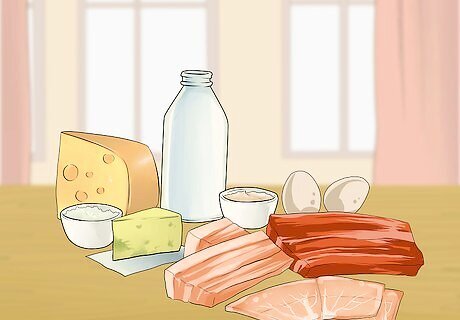
Have protein rich foods like lean meats, eggs, dairy, and beans. To give your breast milk higher nutritional value for your baby, maintain a diet that is rich in good sources of protein. Lean meat like chicken, as well as eggs, milk, beans, and lentils are all good additions to your diet. If you are maintaining a daily calorie intake of 2400 calories, you should have three cups a day of dairy, such as yogurt, milk, or cheese, as well as six and a half ounces of meat and beans, such as fish, lean meat, beans, and nuts. You should always look for seafood that is low in mercury to avoid increasing the mercury levels in your body. Shrimp, canned light tuna, pollack, and salmon are all good options.
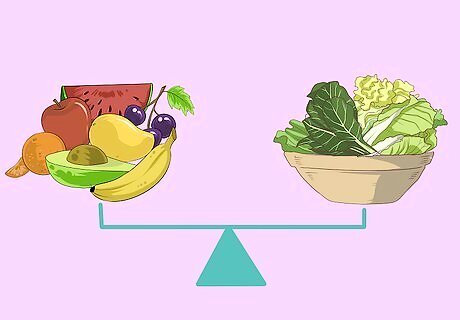
Eat a balanced diet of vegetables, fruits, and whole grains. You should also maintain a good balance of vegetables, fruits, and sources of whole grains, like whole grain bread and brown rich. Remember to always wash your fruits and vegetables before consuming them to reduce your exposure, and your baby’s exposure, to pesticide residue. If you are maintaining a daily calorie intake of 2400 calories, aim for three cups a day of vegetables, such as leafy green vegetables like spinach and kale, orange vegetables like peppers and carrots, and starchy vegetables like squash and potatoes. You should also have two cups a day of a variety of fruits, and eight ounces of whole grains a day.
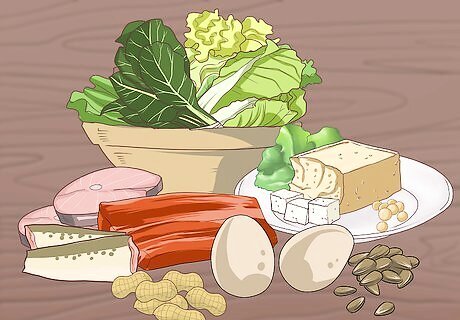
Try to eat a variety of different foods. Having a variety of foods as you breastfeed will actually change the flavor of your breast milk and expose your baby to different tastes. This will help your baby expand her palate and ease into solid foods when she gets older. Most babies will enjoy the flavors of food that come through your breast milk and most mothers do not need to avoid certain foods as they breastfeed.
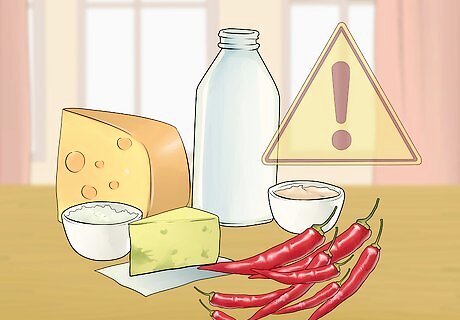
Note any allergic reactions your baby has to foods that you eat. Sometimes, your baby can be sensitive to something you eat, like dairy products or spicy foods, and may display symptoms of an allergy. Keep in mind if your baby displays any sensitivity symptoms or an allergic reaction, she is responding to the food you ate and not to your breast milk itself. If you stop eating the foods that seem to bother your baby or eat less of it, the symptoms should fade on their own. Talk to your doctor if you are concerned about your baby’s reaction to the foods in your breast milk. Your baby may display symptoms of a reaction, including: A green stool that contains mucus and/or blood. Diarrhea and vomiting. A rash, eczema, hives, or dry skin. Fussiness during and/or after feedings. Crying for long periods of time and appearing inconsolable. Waking suddenly in discomfort. Wheezing or coughing. If your baby displays any of these symptoms within minutes of breastfeeding or within 4 to 24 hours of breastfeeding, try to stop eating certain foods to determine the source of the allergy or sensitivity. If your baby has problems breathing, call 911 or head to the nearest emergency room.

Ask your doctor about vitamin and mineral supplements. Your breast milk, coupled with a healthy balanced diet, should provide enough vitamins and minerals for you and your baby. But if you’re concerned about providing enough nutrients for both of you, talk to your doctor about taking vitamin and mineral supplements. Your doctor should check your vitamin A, D, B6, and B12 levels to ensure you have enough nutrients in your body. Undernourished mothers or mothers with health issues may need to take vitamins and minerals like vitamin D supplements and vitamin B12 supplements.

Increase your nutritional intake if you follow a vegetarian diet. Mothers who have a restrictive diet may require more nutrients through adjustments to their diet and vitamin supplements. Your diet should be high in foods that contain iron, protein, and calcium. This includes lentils, whole-grain products, peas, and dark leafy green vegetables. You should also eat citrus fruits to help your body absorb the iron in your food. Your diet should contain foods rich in protein like eggs and dairy products or plant based protein sources like tofu, soy milk, and soy yogurt. Your doctor can also recommend daily vitamin B-12 supplements, which are essential for your baby’s brain development. You also may need vitamin D supplements if you have limited sun exposure and you do not eat vitamin-D rich foods like cow’s milk. Vitamin D is essential for your baby’s diet as it can help her absorb calcium and phosphorus.
Adjusting Your Liquid Intake

Drink water after every feeding. Your fluid intake does not affect the amount of breast milk you produce, but you should drink when you’re thirsty and try to drink water after every feeding. Try to stick to just water and avoid drinks high in added sugars, like soft drinks and fruit drinks.

Limit yourself to less than three cups of coffee or caffeinated beverages a day. Be careful about consuming too much caffeine, as it can cause your baby to act fussy and not sleep well. You can drink a moderate amount, up to three cups a day of coffee or other caffeinated beverages.

Limit alcohol while breastfeeding. It is okay to have a drink now and then while you are breast feeding. A small amount of alcohol in your breast milk is unlikely to harm your baby, especially if your baby is more than a few months old. If you have more an one drink, then you may want to avoid breast-feeding until the alcohol has been cleared out of your system. Depending on your body weight, 12 ounces of 5 percent beer, 5 ounces of 11 percent wine, or 1.5 ounces of 40 percent liquor takes two to three hours to clear out of your body. Do not try to pump and dump your breast milk in an attempt to speed up the removal of the alcohol from your breast milk, as this will not work. The best course is to wait a sufficient amount of time for the alcohol to clear your system.




















Comments
0 comment